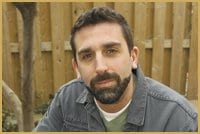Story ideas don’t come easily or quickly to novelist John Miller. He finds it easier to write under the veil of white noise that hangs in public places than he does surrounded by the distracting comforts of home. For at least the past four years, he’s started almost every morning at his favourite table at a Toronto Starbucks. He’s been a fixture there, hunched over his notebook computer, meticulously writing, rewriting, polishing and refining his second novel, A Sharp Intake of Breath.
“I try to tell a good story, one that’s moving and at times funny and amusing,” he almost whispers into the phone. “I hope I’ve told a story that’s engaging in its themes but primarily about people’s lives and their search for humanity.”
A Sharp Intake of Breath is the story of Toshy Wolfman. Born into a liberal Jewish family in Toronto in the 1930s, Toshy’s formative years are defined by the insecurity and rejection he feels because of his cleft lip and palate and attendant speech impediment.
Even though he’s blessed with a photographic memory, straight, young Toshy’s funny-looking lip, breathy nasally voice, and difficulty making word sounds that require contact between tongue and palate, cause peers to drive him away with taunts of “hare, ape, and serpent,” and adults to brand him as stupid and without potential.
As happens, children who are too often told that they are worthless are apt to become teenagers who believe they are worthless. Toshy wrestles with those demons, developing a soft case of adolescent kleptomania that consigns him to the Kingston Penitentiary for the dawning years of his manhood. It’s a snap decision that leads him to prison, contributes to his maturation and follows him into old age.
“The protagonist has gay people in his life and gets to see and look at them from the perspective of another kind of outsider,” says Miller. “In The Featherbed [Miller’s first novel] there were a lot of issues around women’s sexuality and subjugation. In A Sharp Intake of Breath, the issues are more around feelings of attractiveness and marginalization because of stigma based on looks and perceived disability.”
Also carried over from The Featherbed is the author’s attention to historical context. His muse seems to draw him backward in time as Miller imagines the experiences contemporaries of his parents and grandparents may have had. His meticulous attention to historical accuracy and context casts his fiction in credible relief against what were real circumstances.
A good example of Miller’s affinity for history is the presence of Emma Goldman in both of his novels. Goldman, who died in Toronto in 1940, was an internationally known radical feminist and anarchist activist. She was one of the few people to speak out in defence of queer sexualities at a time when Oscar Wilde was at labour at Reading Gaol. Her passionate belief that, “The most vital right is the right to love and be loved,” exposed her to harsh criticism, even from her allies, for defending perversion.
Later, she was called “one of the most dangerous women in America,” by famously repressed American FBI director, J Edgar Hoover.
In A Sharp Intake of Breath, Toshy’s sister Lil tracks Goldman down and becomes a devotee. That association lingers in Toshy’s life into old age.
“I became fascinated with Emma Goldman when I was in high school,” recalls Miller. “She was so far ahead of her time and so courageous in her ideas about rights for women and gay people and sexuality in general. And she was able to steadfastly hold onto her ideals, many of which are still progressive today, in spite of constant persecution from the state and police.
“The other piece of that is that a friend of my grandmother’s was a secretary for Emma Goldman in Toronto in the ’30s,” he explains. “That story was the spark that got me thinking about the character of Lil. What would it have been like as a young woman to have known Emma Goldman, who would already have been in her 60s at that time, to become a colleague and comrade of hers, and be influenced by her?”
Technically, Miller’s prose is sophisticated but not flowery. His story and character arcs are reasonably well conceptualized and intricate enough to engross readers without risking confusion.
A time or two, dialogue seems to overtly explain plot devices that would have been wielded more elegantly by the writer if left in the realm of nuance. And some plot devices are derivative enough to flirt with the cliché, but these are minor quibbles for the sake of honest criticism.
Although marginalization is the central theme, A Sharp Intake of Breath is by no means a dark and gloomy story that serves only to validate and enable the victim mentality that afflicts so many in the queer community.
There are moments of humour, heroism and suspense, but not a single one of despair. Toshy never loses his tight familial connection with his sisters. He values and honours friends, family and lovers in his life and never becomes embittered.
Nor is this a story bristling with gruelling political theory. It’s a rich tale about the lives of people that easily draws, and largely keeps, reader attention.
In all, A Sharp Intake of Breath is a strong second novel by a talented queer Canadian writer. It’s one that is well worth reading.

 Why you can trust Xtra
Why you can trust Xtra


